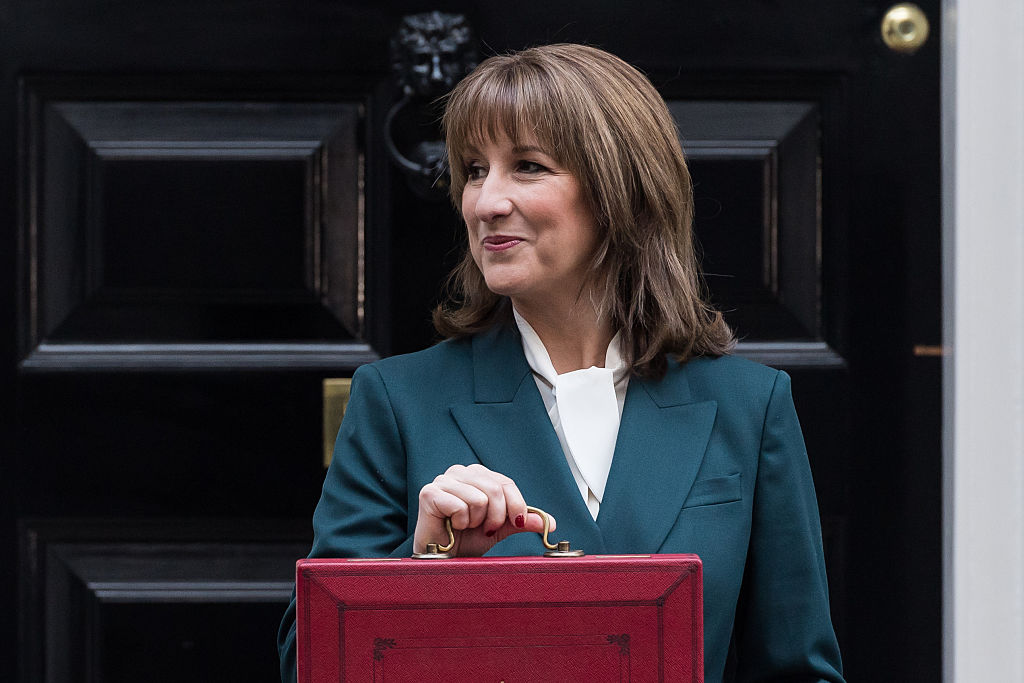UK regions where mansion tax proposals could hit homeowners hardest
Rumours a mansion tax could be announced in the Autumn Budget are already hitting the housing market but homeowners are being urged not to panic yet


Get the latest financial news, insights and expert analysis from our award-winning MoneyWeek team, to help you understand what really matters when it comes to your finances.
You are now subscribed
Your newsletter sign-up was successful
Want to add more newsletters?

Twice daily
MoneyWeek
Get the latest financial news, insights and expert analysis from our award-winning MoneyWeek team, to help you understand what really matters when it comes to your finances.

Four times a week
Look After My Bills
Sign up to our free money-saving newsletter, filled with the latest news and expert advice to help you find the best tips and deals for managing your bills. Start saving today!
Chancellor Rachel Reeves is rumoured to be set to hit homeowners with a property worth £2 million or more with a mansion tax in the Autumn Budget.
Reeves has reportedly been considering an overhaul of property taxes to balance the books in her much-anticipated Budget and one of the main policy changes could be a mansion tax.
Reports in the Daily Telegraph have suggested the chancellor could introduce a regular 1% charge on homes worth above £2 million, which would be collected through council tax.
MoneyWeek
Subscribe to MoneyWeek today and get your first six magazine issues absolutely FREE

Sign up to Money Morning
Don't miss the latest investment and personal finances news, market analysis, plus money-saving tips with our free twice-daily newsletter
Don't miss the latest investment and personal finances news, market analysis, plus money-saving tips with our free twice-daily newsletter
There are suggestions that the mansion tax could be capped at £5,000 per year.
That is not the only rumoured change though.
Reeves is also reported to be considering replacing stamp duty with a new national property tax on the sale of homes worth more than £500,000 and introducing a capital gains tax charge on properties that sell for more than £1.5 million.
Nothing has been confirmed and the Treasury hasn’t commented but there are already signs that the rumours are hitting the property market.
Data from property website Rightmove shows sales agreed for £2 million-plus homes, which are the subject of a potential mansion tax, are already down 13% year-on-year.
Homes priced between £500,000 and £2 million, which would be impacted by stamp duty changes in England or the rumoured capital gains tax, have seen sales agreed drop by 8% year-on-year
Estate agents say they have also seen a change in activity.
Dominic Agace, chief executive of estate agency brand Winkworth, said this mooted move will create more uncertainty at the highest end of the property market, due to its predicted escalatory nature, at a time when the market is already under pressure as a result of Budget speculation since the summer.
He said: "Guidance will need to be provided swiftly on the highest potential tax charge, so everyone can adjust accordingly.
“With non-dom tax changes, VAT on school fees and mortgage rate increases, this will just add to more pressure on those living in these homes worth £2 million upwards, particularly in London where owners may have leveraged up to buy them."
The threat of a mansion tax could be good for those looking to move up the ladder if it causes prices to drop below wherever the threshold is set.
But there are warnings that shifting stamp duty to sellers and introducing a mansion tax would reduce the incentive for people to downsize and further restrict supply.
This could push up house prices further.
There will also be a big regional divide as the changes would have more of an impact in the south of England and London where property prices tend to be higher.
Which regions could be worst-hit by a national property tax?
Rightmove data suggests that just under a third of homes for sale in England are priced at above £500,000, and would be subject to the proposed new annual property tax, which would replace stamp duty if the policy came into force.
Homeowners in London would be the worst hit, with 59% of homes in the capital currently listed with an asking price of more than £500,000.
In contrast, just 8% of listings in the North East of England are above the £500,000 threshold.
The tax may not even attract as much as the Treasury hopes for.
A fifth of agreed property sales so far this year in England have been for homes over £500,000, Rightmove said, with 52% in London and just 4% in the North East.
How a mansion tax would hit homeowners
Currently, homeowners don’t pay any capital gains tax when selling their main property.
But one policy rumour is that the Treasury is considering applying capital gains tax when home sales reach above £1.5 million.
This would mean these sellers are treated the same as those selling an investment property.
The policy may be a winner with left-wing voters but Rightmove data shows just over 1% of all home sales agreed this year have been for properties worth above £1.5 million.
In London, one in ten (11%) of homes for sale are in this price bracket, with 5% of agreed sales so far this year being for homes above £1.5 million.
In the South West, 0.7% of agreed sales are in the £1.5 million price band, with 2% of available homes for sale in this price bracket.
In the North East, just 0.1% of agreed sales are in this upper-end bracket, with only 0.5% of all properties available for sale priced at over £1.5 million.
There are also reports that there could be an annual charge on high value homes, which may incentivise older homeowners to sell-up and downsize.
Laith Khalaf, head of investment analysis at AJ Bell, said the wealthiest would be hardest hit by charging CGT on high-value properties but there would likely be a knock-on effect for middle income families because anyone with a big tax liability may opt to sit tight in their property, causing a log jam in the housing ladder below them.
He said: “It’s far from certain that such tax changes will take place, but if they do, much will depend on the precise threshold at which CGT becomes payable in terms of the number of people affected.
“Even if such a ‘mansion tax’ is set at a high level, it would naturally cause people on middle incomes to worry it was just the thin end of the wedge, and the next time the government needs a bit of money they could just lower the threshold.
“Homeowners would also need to keep records of the costs of improvements they made to properties in order to offset them against any capital gains tax. That would be the case even for those with properties under the threshold, in case one day those houses grow in value enough to be drawn into taxation.”
How should homeowners react to proposed property tax changes?
For now, claims of property tax changes are just speculation.
Experts are warning against rushing into decisions based on rumours.
Sarah Coles, head of personal finance at Hargreaves Lansdown, said it’s vital not to be driven into doing anything you wouldn’t otherwise consider.
She said: “If you’re worried about tax on downsizing, the key again is not to rush into anything. Downsizing is a major life change, involving all sorts of compromises and changes, and shouldn’t be rushed before you’re ready for it.
"This is your home, and you need to be happy in it. Ask yourself if you would be considering the move if it wasn’t for the rumours, and how you would feel if nothing ended up changing. That should help you decide if it’s right for you.”
But Johan Svanstrom, chief executive of Rightmove, has urged the Treasury to consider if these changes would be worth it financially and socially.
He said: “There is no real incentive for someone in a large home to downsize to a smaller one unless they truly need to and can still afford the stamp duty bill. The current rumours to stamp duty changes would only seem to exacerbate this, as it may deter some at the top of the market from moving if they would then face a new annual tax.”
Svanstrom highlighted that Rightmove’s data shows a proposed mansion tax would only affect a small proportion of the market.
He added: “The government needs to be cautious over the cumulative effect of taxation on higher priced areas of the country as it simply risks stalling this part of the market, since the importance of mobility for people and the overall economy is strong in those areas too.
“A slower market can affect all types of movers, from first-time buyers to key workers and families, even if a tax is aimed at higher value properties.”
The property website has made other suggestions of ways to boost the property market including letting home buyers stagger stamp duty payments rather than shifting the tax to the seller, as the government is rumoured to be considering.
Get the latest financial news, insights and expert analysis from our award-winning MoneyWeek team, to help you understand what really matters when it comes to your finances.

Marc Shoffman is an award-winning freelance journalist specialising in business, personal finance and property. His work has appeared in print and online publications ranging from FT Business to The Times, Mail on Sunday and the i newspaper. He also co-presents the In For A Penny financial planning podcast.
-
 Should you buy an active ETF?
Should you buy an active ETF?ETFs are often mischaracterised as passive products, but they can be a convenient way to add active management to your portfolio
-
 Power up your pension before 5 April – easy ways to save before the tax year end
Power up your pension before 5 April – easy ways to save before the tax year endWith the end of the tax year looming, pension savers currently have a window to review and maximise what’s going into their retirement funds – we look at how
-
 Rachel Reeves is rediscovering the Laffer curve
Rachel Reeves is rediscovering the Laffer curveOpinion If you keep raising taxes, at some point, you start to bring in less revenue. Rachel Reeves has shown the way, says Matthew Lynn
-
 Investing in forestry: a tax-efficient way to grow your wealth
Investing in forestry: a tax-efficient way to grow your wealthRecord sums are pouring into forestry funds. It makes sense to join the rush, says David Prosser
-
 'Expect more policy U-turns from Keir Starmer'
'Expect more policy U-turns from Keir Starmer'Opinion Keir Starmer’s government quickly changes its mind as soon as it runs into any opposition. It isn't hard to work out where the next U-turns will come from
-
 Rachel Reeves's punishing rise in business rates will crush the British economy
Rachel Reeves's punishing rise in business rates will crush the British economyOpinion By piling more and more stealth taxes onto businesses, the government is repeating exactly the same mistake of its first Budget, says Matthew Lynn
-
 The consequences of the Autumn Budget – and what it means for the UK economy
The consequences of the Autumn Budget – and what it means for the UK economyOpinion A directionless and floundering government has ducked the hard choices at the Autumn Budget, says Simon Wilson
-
 Why UK stocks are set to boom
Why UK stocks are set to boomOpinion Despite Labour, there is scope for UK stocks to make more gains in the years ahead, says Max King
-
 Electric vehicle drivers to be charged new per mile tax from 2028
Electric vehicle drivers to be charged new per mile tax from 2028Electric vehicle drivers will be forced to pay a 3p per mile tax, as taxation will be brought closer in line with petrol and diesel cars
-
 Salary sacrifice cap of £2,000 to be introduced in 2029
Salary sacrifice cap of £2,000 to be introduced in 2029The government says 74% of basic rate taxpayers currently using salary sacrifice will be unaffected by the change